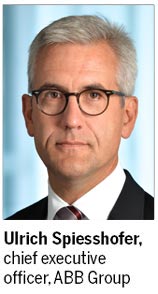
Research commissioned by ABB Group, the power and automation technology company headquartered in Switzerland, confirms that energy efficiency remains a high priority for industrial executives.
Of more than 300 in manufacturing and power sectors surveyed by the Economist Intelligence Unit, almost all said energy efficiency will be a crucial success factor for their companies over the next two decades. But three-quarters of them also said they face barriers in improving energy efficiency and data.
This could be a problem not only for reasons of industrial competitiveness - energy costs are high and rising - but because energy efficiency is the most effective way to limit our impact on the environment.
It may not be exciting or glamorous, but reducing the amount of energy used for the same or a greater amount of output is unquestionably the most sustainable approach one can use.
So how much room is there for industrial companies to improve their energy efficiency? The first thing to note is that significant progress has been made over the past 20 years in the most energy-intensive industries.
Many producers in the steel industry, which is the main industrial energy user, have dramatically reduced consumption by switching from blast furnaces to electrical processes, which use only half the energy. However, among those that have gone the electrical route, wide national and regional variations emerge (consumption in China, Russia, Ukraine and Brazil is 1.5 to two times higher than in Japan, for instance).
Take China, for example. While the share of industrial energy consumption remains stable on a worldwide level and is decreasing in developed countries, it is increasing in China: from 34 percent in 1990 to 40 percent in 2010.
The share of the power sector there went from 17 percent to 37 percent in that period because of the rapid growth of electricity use (consumption rose eightfold between 1990 and 2011).
Total energy intensity decreased by 4.8 percent per year in the same period. That rapid trend, among the top 10 performances in the world, is certainly related to the high energy intensity that prevailed in the 1990s.
Since 2000, Chinese total energy intensity has decreased at a slower pace (2.8 percent per year). Industrial energy intensity dropped significantly between 1990 and 2011. As a result, the industrial sector contributed to about 30 percent of the total energy intensity decrease during this period.
Worldwide, the potential for further energy savings is estimated at 40 percent, or 250 million tons of oil equivalent (Mtoe), which is equal to the energy consumption of France or Brazil.
Similar considerations apply in the cement industry, the third-largest industrial energy user. If the main producing countries were to have the same energy efficiency as the world's best performers (Mexico, Germany and the US), the energy consumption of the industry as a whole would drop by 20 percent - 50 Mtoe.
But, according to the EIU survey, the three main barriers to investments in energy efficiency are the lack of a clear-cut financial case, a lack of funds for large infrastructure investments and the lack of usable information on energy efficiency options.
Fully 28 percent of firms that were surveyed said that in times of tight resources, companies must choose between allocating capital to measures that save money and those that provide growth opportunities.
This suggests that many firms do not fully appreciate that being more efficient can lead to a competitive advantage, which in turn can lead to profitable growth.
The survey also showed that while information about the benefits of investing in energy efficiency has improved, 71 percent of companies said that "industries need clearer benchmarks for what constitutes energy efficiency" in their sectors. It's difficult to make the right decisions concerning resource efficiency if there is no agreement on benchmarks and companies are afraid of missing out on growth opportunities.
From the survey's findings, I would say that it's clear that we in industry must make a greater effort to raise awareness of the opportunities offered by energy efficiency. We also need to continue investing in technology and to work with politicians to make sure we have a regulatory environment that strives for predictability and clarity in energy efficiency.
The findings referred to in this article can be accessed in "Trends in global energy efficiency," a white paper by the Economist Intelligence Unit based on a survey of 317 senior industry executives, and research by Enerdata.
The author is chief executive officer of ABB Group.
